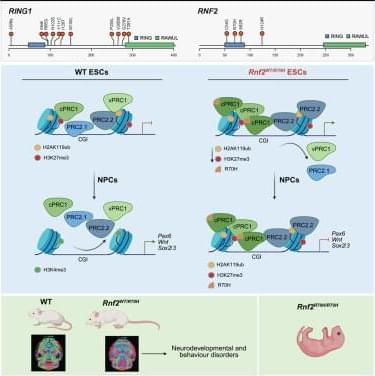Neurodevelopmental disorders from Polycomb complex missense mutations.
The causes of many neurodevelopmental disorders (NDDs) is yet to be determined.
The researchers report new missense mutations in the Polycomb repressive complex 1 (PRC1) E3 ligases RNF2 and RING1 in individuals with neurodevelopmental disorders.
Functional dissection of a deleterious variant reveals that balanced co-recruitment of Polycomb complexes to chromatin is essential for proper neurogenesis and for normal brain function and behavior. sciencenewshighlights ScienceMission https://sciencemission.com/Polycomb-complexes-drives-NDDs
Borges, González-Blanco, Arigela, et al. report new missense mutations in the PRC1 genes RNF2 and RING1 in individuals with neurodevelopmental disorders. Functional dissection of a deleterious variant reveals that balanced co-recruitment of Polycomb complexes to chromatin is essential for proper neurogenesis and for normal brain function and behavior.








